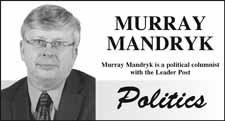If most other jobs had the same philosophy towards savings as government, they wouldn't do very well.
After all, would there be many viable farms if every dollar made were instantly ploughed back into paying down machinery loans with no thought of how to keep the operation viability in the lean years?
So why would it make sense to wait until the Saskatchewan debt is fully paid down before we begin to start to save any money through Premier Brad Wall's Saskatchewan Heritage Initiative?
Despite all the other good ideas in Wall's growth agenda, the Heritage Fund proposal doesn't seem all that well thought out.
Perhaps this isn't surprising.
Governments do tend to think in four-year cycles that generally involve things like tax breaks, utility rebates and spending or more tangible infrastructure projects they can talk about when they seek voter support. Savings are seldom top-of-mind.
This Heritage Fund also an idea borrowed from Dwain Lingenfelter and the NDP, who campaigned on a Heritage/Sovereign Fund in the election a year ago. To simply adopt the Lingenfelter model - which didn't seem all that well defined in the first place - makes no sense. More thought was obviously required.
For that reason, it makes sense for Wall to get former University of Saskatchewan president Peter MacKinnon (who happens to the husband of former NDP finance minister, Janice MacKinnon) to explore the model that would best fit this province. MacKinnon will travel the world in the coming year looking at funds from Norway to Alaska - two models Lingenfelter cited last year.
It also likely makes to ensure that MacKinnon's parameters are as open-end as possible. In fairness to Wall, he has suggested in interviews that there may be more flexibility than the paper's suggested when it comes to waiting for the debt to paid off before starting the fund. He added that when the fund starts is something MacKinnon will be tasked to examine.
This is a hopeful sign.
One practical problem for Saskatchewan is that our current budgets are razor-thin - even with the strong resource economy. This begs the question: How do we fund the Fund? Raising potash or oil royalties is something that Wall said he has no interest in doing.
And whether we will naturally gain more revenue through resource expansion and increased production is a question. For example, the mine at Kronau has already been nixed. PotashCorp is shutting down its operations for eight weeks. And the latest development sees BMO warning BHP Billiton that pouring money into the massive Jansen mine - what would be the biggest in world - makes little sense when the world is already suffering from an over supply of potash.
But despite all this, it doesn't make sense to wait for debt to be paid down.
In fact, it's especially critical that we don't wait, given the nature of such Heritage Funds. They are quite capable of generating their own revenue through interest or putting the dollars in investments.
One gets that this has become a province - at least on the political rhetoric level - obsessed with debt paydown. It's what politicians tell us is necessary. It's what people say they want.
But if the current debt situation is manageable, is it really necessary to wait until every penny of debt is paid before we start saving? Would any of us decide not to start saving for our own retirement until our mortgage is paid off?
At the current snail's pace of debt paydown, it will be another 60 years before our debt is eliminated. Only then would be able to start the fund.
The sooner we start looking at putting something aside from our one-time non-renewal resources, the better off we will all be.
Murray Mandryk has been covering provincial politics for over 15 years.




